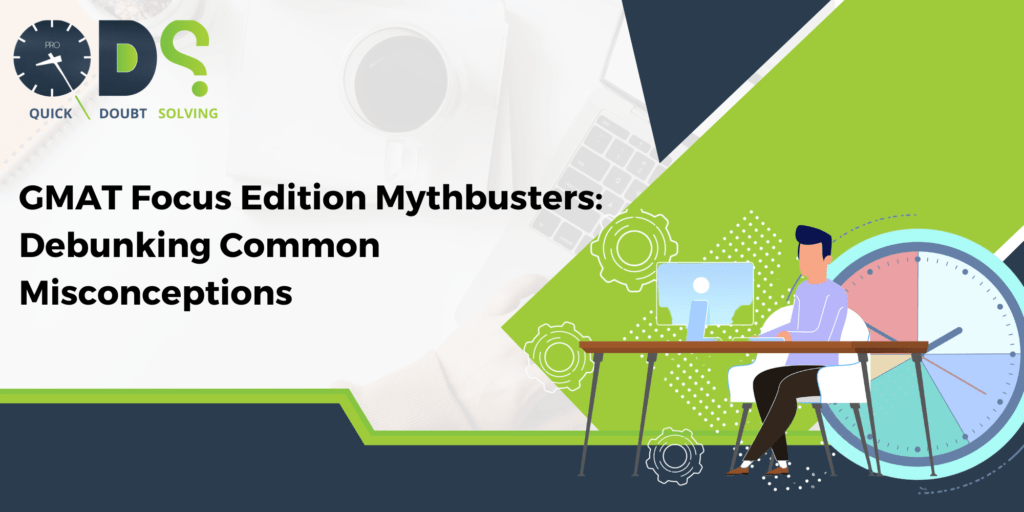
GMAT myths and misunderstandings are common nowadays, and anyone preparing for the exam has undoubtedly heard a couple. For example, you may have heard that you can’t do well on the Quant portion if you’re not “a math person.” What about the misconception that you should spend more time on the first few questions in each section?
Believing these falsehoods can reduce the effectiveness of your GMAT preparation and significantly lower your score on test day. However, with so much contradicting information, it can be challenging to distinguish fact from fantasy.
Are you considering taking the GMAT Focus Edition for your business school application? With so many admission examinations available, selecting the correct one can be challenging. But do not worry—we are here to help you make an informed selection.
In this post, we’ll explain the most common myths about the GMAT Focus Edition and give you all the knowledge you need to secure a position in business school.
Is the GMAT Focus Edition Fact or Fiction?
The GMAT, a standardized test widely utilized by numerous business schools during their admission process, is crucial in evaluating candidates. It evaluates analytical writing, integrated reasoning, and quantitative and verbal skills and is widely regarded as a dependable indicator of academic achievement in graduate management programs.
But what about the GMAT Focus Edition? Does it differ from the GMAT, or does it possess distinctive qualities? Let’s uncover the truth by dispelling some misconceptions about this exam.
Debunking Myth 1: Achieving a Higher Score is Not as Challenging as You Think
Achieving better scores on the GMAT Focus Edition is not necessarily more challenging than the previous version of the GMAT.
According to Andrea McHale, the Director of Admissions at the University of Michigan’s Ross Schools of Business, the scoring scale has been recalibrated. This adjustment aims to create a more equitable evaluation of candidates and promote fairness among all applicants, regardless of which version of the exam they take.
As an illustration, a GMAT Focus Edition score of 645 is comparable to a previous scale score of 700, indicating an 86th percentile ranking. Therefore, regardless of the variations in numbers, the level of performance remains consistent.
When evaluating GMAT Focus scores, McHale shows confidence in her team’s knowledge of the new scale. She mentions that the resources and training provided by GMAC have equipped their admissions team to swiftly determine the percentile equivalent of a GMAT Focus score, such as recognizing that a score of 655 corresponds to the 90th percentile.
Recognizing that a specific numerical value doesn’t solely determine a competitive score is crucial. Achieving a score above 545 on the GMAT Focus indicates a strong performance compared to your peers, placing you at or above the 50th percentile. It means you have outperformed over half of all test-takers, which is impressive. Your ranking will be displayed on your unofficial and Official Score Report.
Debunking Myth 2: The Correct Answer Does Not Mirror the Exact Wording of the Passage
Many test takers have succumbed to the prevalent GMAT fallacy that correct answers employ precise terminology from the passage while incorrect ones use wording that differs from it. If only GMAT Verbal were this simple.
The reality is that GMAT Focus Verbal questions frequently try to trick you into selecting erroneous answers by making them look to say what the passage says. They make these wrong answers appear to repeat what the passage says by utilizing exact words and phrases.
Meanwhile, verbal questions will conceal accurate responses using terminology different from the passage.
Of course, GMAT Verbal is far more than a word-matching game. It is an assessment of our logical reasoning and understanding abilities. So, what happens if we limit our study of answer choices to the surface level, assuming that terms in the passage are “more correct”? We must perform better on the GMAT Verbal on easy or difficult questions.
Let’s go deeper into our analysis and make logic and meaning, rather than a phrase, the primary criterion for judging the merits of answer alternatives. In that case, we can avoid trap answers and significantly increase the number of questions we correctly answer.
Correct replies may use exact terminology from the passage. The key is that they can follow easy and fast rules. Investigate the significance of each answer choice and how it relates to the passage. It is the only reliable way to achieve higher GMAT Focus Verbal scores.
Debunking Myth 3: Schools Show No Preference for Previous Scores
Many things could be improved surrounding Critical Reasoning in the GMAT Verbal section. This could be because many test-takers find CR questions among the most challenging questions on the exam. Unsurprisingly, individuals seek out “hacks” and shortcuts to simplify the process of finding accurate CR answers.
One strategy is to remove answer choices that may seem excessively extreme and unlikely to be correct. For instance, a person taking a test may instinctively rule out any answer options in the CR section that contain words like “only,” “always,” or “none.” The test-taker believes that using those words indicates a high level of certainty, which may not be accurate in a CR question.
Eliminating incorrect choices in GMAT Focus questions is not as straightforward as memorizing a list of “bad” words. Otherwise, Critical Reasoning would only effectively assess people’s reasoning abilities!
Of course, considering the specific question, it’s possible to remove confident answer choices in CR that make exaggerated or sweeping statements. Nevertheless, these statements may be valid depending on the particular circumstances. A thorough examination of the question is necessary to assess if a specific CR answer choice is making a statement that is too broad or exaggerated. It’s essential to only fixate on a word that may lead to an incorrect conclusion.
Occasionally, a bold statement achieves the desired effect of the correct answer. For some people, it simply doesn’t work. Therefore, removing extreme options is not a dependable tactic.
Debunking Myth 4: Reading the Entire Passage is Inefficient for Reading Comprehension
One of the most popular time-management lies GMAT test aspirants hear about GMAT Focus Verbal is that they should only read the first and last sentences of each paragraph in an RC passage before attempting to answer the related questions.
The idea behind this poor method is that the first and end phrases summarise the paragraph. Then, any specifics raised by the questions can be found later in the passage as needed. The stated goal of this method is—you guessed it—to save time.
However, the myth of the first and last sentence contains some reality. However, it takes such realities to an illogical and counterproductive extreme. Let’s look into why.
It would help if you gained an overall understanding of the passage.
Indeed, The beginning and end of paragraphs usually express the essential themes of a passage. However, it is only sometimes valid that the crucial aspects of each paragraph appear in the first and last sentences. It is false that no significant points are delivered amid a paragraph; the author’s conclusion is always the last sentence of a passage or any other comparable rule.
Sure, you can obtain a “snapshot” of what a piece is about from the first and last sentences. However, it would help if you had a stronger sense of how those debates relate to one another or the author’s thoughts and opinions.
Furthermore, your understanding of the passage will need to be improved. And many RC questions assess your general grasp. For example, the primary goal, author’s tone, and structural questions all evaluate your knowledge of the “big picture” of RC passages.
It would help if you had situational awareness.
Another area for improvement with reading only the first and last sentences is that you will likely have to look for specific details later, which will take longer than if you read the piece as a whole.
Indeed, you should pay little attention to every detail in a piece the first time you read it. However, if you skip the details and only read each paragraph’s first and last sentences, you will lose track of where distinct information appears in the chapter.
In other words, you will lack the situational awareness required to state, “Oh, the characteristics of the study participants were mentioned somewhere in paragraph 2.” That kind of situational awareness will allow you to skip straight to paragraph 2 while other test takers scan the entire passage for the information the question calls for.
Test-takers who read through the passage at first—not to memorize details, but for basic, general comprehension—spend less time responding to RC questions than others. Why? Because they already have a basic understanding of the paragraph in question.
Other test takers review sections of the passage multiple times, looking for the information they need and attempting to logically relate it to different parts of the passage they have yet to read. They frequently need more time to answer all of the questions in the Verbal part.
Debunking the Myth: Is the Truth About the GMAT More Difficult Than Verbal Practice Questions?
Some GMAT students express concerns about their performance on test day due to the perceived difficulty of Verbal questions on the actual GMAT Focus Edition compared to practice questions.
Practising Verbal questions is more complicated. Contrary to popular belief, RC passages on the GMAT Focus are sometimes more complex than practice passages.
However, the difficulty level of your practice questions for the GMAT will vary depending on the resources you choose for your GMAT preparation. Take the Target Test Prep GMAT Focus Course as an illustration. It includes a vast collection of verbal, quantitative, and data insights practice questions experienced experts have carefully designed. These questions have been created with a deep understanding of the intricacies of GMAT question patterns.
Therefore, searching for a reliable source that has received positive feedback from previous GMAT students is advisable. These students should have found the study material helpful in tackling the Verbal questions they encountered during the exam. Make sure to utilize official tests from mba.com when you sit for full-length practice tests during the final stages of your GMAT preparation. These tests closely resemble the actual GMAT Focus. Therefore, your performance on them will indicate whether you are ready to achieve your desired Verbal score on the test day.



